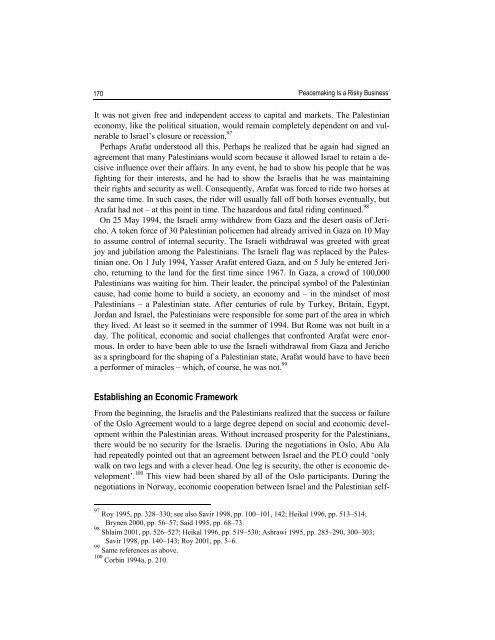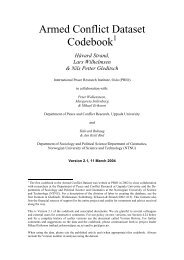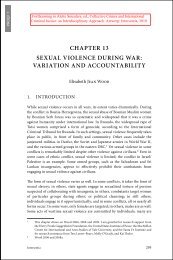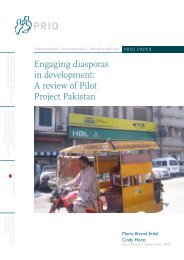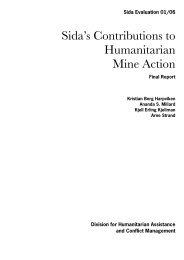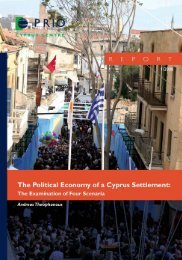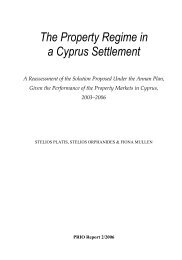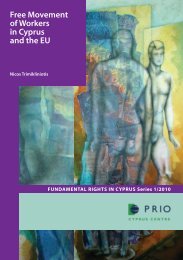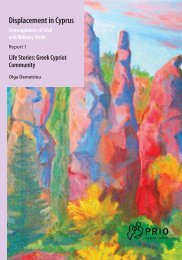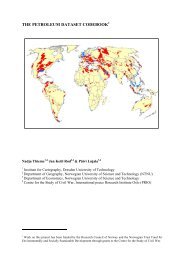Peacemaking Is a Risky Business - PRIO
Peacemaking Is a Risky Business - PRIO
Peacemaking Is a Risky Business - PRIO
Create successful ePaper yourself
Turn your PDF publications into a flip-book with our unique Google optimized e-Paper software.
170 ‘<strong>Peacemaking</strong> <strong>Is</strong> a <strong>Risky</strong> <strong>Business</strong>’It was not given free and independent access to capital and markets. The Palestinianeconomy, like the political situation, would remain completely dependent on and vulnerableto <strong>Is</strong>rael’s closure or recession. 97Perhaps Arafat understood all this. Perhaps he realized that he again had signed anagreement that many Palestinians would scorn because it allowed <strong>Is</strong>rael to retain a decisiveinfluence over their affairs. In any event, he had to show his people that he wasfighting for their interests, and he had to show the <strong>Is</strong>raelis that he was maintainingtheir rights and security as well. Consequently, Arafat was forced to ride two horses atthe same time. In such cases, the rider will usually fall off both horses eventually, butArafat had not – at this point in time. The hazardous and fatal riding continued. 98On 25 May 1994, the <strong>Is</strong>raeli army withdrew from Gaza and the desert oasis of Jericho.A token force of 30 Palestinian policemen had already arrived in Gaza on 10 Mayto assume control of internal security. The <strong>Is</strong>raeli withdrawal was greeted with greatjoy and jubilation among the Palestinians. The <strong>Is</strong>raeli flag was replaced by the Palestinianone. On 1 July 1994, Yasser Arafat entered Gaza, and on 5 July he entered Jericho,returning to the land for the first time since 1967. In Gaza, a crowd of 100,000Palestinians was waiting for him. Their leader, the principal symbol of the Palestiniancause, had come home to build a society, an economy and – in the mindset of mostPalestinians – a Palestinian state. After centuries of rule by Turkey, Britain, Egypt,Jordan and <strong>Is</strong>rael, the Palestinians were responsible for some part of the area in whichthey lived. At least so it seemed in the summer of 1994. But Rome was not built in aday. The political, economic and social challenges that confronted Arafat were enormous.In order to have been able to use the <strong>Is</strong>raeli withdrawal from Gaza and Jerichoas a springboard for the shaping of a Palestinian state, Arafat would have to have beena performer of miracles – which, of course, he was not. 99Establishing an Economic FrameworkFrom the beginning, the <strong>Is</strong>raelis and the Palestinians realized that the success or failureof the Oslo Agreement would to a large degree depend on social and economic developmentwithin the Palestinian areas. Without increased prosperity for the Palestinians,there would be no security for the <strong>Is</strong>raelis. During the negotiations in Oslo, Abu Alahad repeatedly pointed out that an agreement between <strong>Is</strong>rael and the PLO could ‘onlywalk on two legs and with a clever head. One leg is security, the other is economic development’.100 This view had been shared by all of the Oslo participants. During thenegotiations in Norway, economic cooperation between <strong>Is</strong>rael and the Palestinian self-97 Roy 1995, pp. 328–330; see also Savir 1998, pp. 100–101, 142; Heikal 1996, pp. 513–514;Brynen 2000, pp. 56–57; Said 1995, pp. 68–73.98 Shlaim 2001, pp. 526–527; Heikal 1996, pp. 519–530; Ashrawi 1995, pp. 285–290, 300–303;Savir 1998, pp. 140–143; Roy 2001, pp. 5–6.99 Same references as above.100 Corbin 1994a, p. 210.


